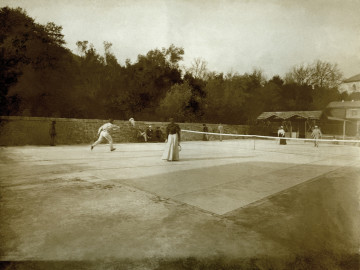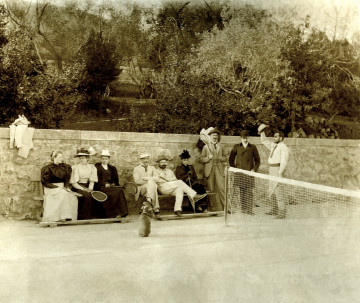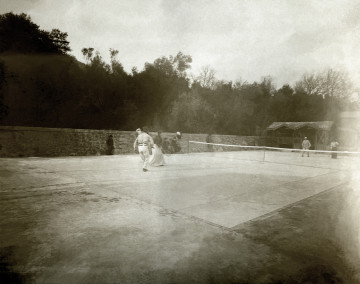
Tennis game
Castle Museum in Łańcut
Part of the collection: European classics of modernity
Teresa Tyszkiewicz studied at the Warsaw Academy of Fine Arts under Tadeusz Pruszkowski in the years 1928-1933, but she defended her diploma under the supervision of Felicjan Szczęsny Kowarski among the first post-war graduates of the academy (1946). In the 1930s, she was closest to Kraków's colourists and the work of Tytus Czyżewski, while critics noted direct links between Tyszkiewicz's paintings and the French post-impressionist tradition, which were characteristic of Polish art in that decade. The year 1945 did not bring about any fundamental shifts in artistic geography, yet cubist surrealism became the dominant tendency. Its role on the domestic art scene was determined by an exposition of French painters and illustrators, presented in 1946 in Warsaw, Krakow and Poznań, during which works by André Fougeron, Léon Gischia, André Masson or Édouard Pignon, among others, were shown. At the same time, under the patronage of Tadeusz Kantor, the All-Poland Group of Young Visual Artists was established, which Tyszkiewicz joined, fascinated by the theory of Carl Gustav Jung. In 1947, she took part in the first exhibition of the movement in the Warsaw Club of Young Artists and Scientists. The culmination of this period of experimentation was the Modern Art Exhibition in Krakow at the turn of 1948/1949, to which the painter sent four strongly abstracted compositions built of thick black lines filled with colourful fields. The Szczecin painting represents this Picasso-vitalising stylistics. Football-related themes were already a classic interest of modern art. It was institutionally supported by the International Olympic Committee, which from 1912 organised parallel to the athletes' competition the Olympic Art Competitions. The last one, with the participation of Polish artists, was held in 1948, but its national edition was still continued.
Szymon Piotr Kubiak
Author / creator
Dimensions
cały obiekt: height: 100 cm, width: 79 cm
Object type
painting
Creation time / dating
Creation / finding place
Identification number
Location / status

Castle Museum in Łańcut

Castle Museum in Łańcut

XIX century
Castle Museum in Łańcut
DISCOVER this TOPIC
National Museum in Lublin
DISCOVER this PATH
Educational path